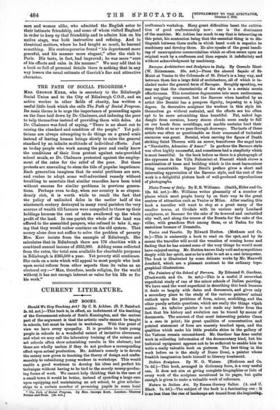THE PATH OF SOCIAL PROGRESS.*
MRS. GEORGE KERR, who is secretary to the Edinburgh Social Union and to the City of Edinburgh C.O.S., and an active worker in other fields of charity, has written a useful little book which she calls The Path of Social Progress. Its main theme is to urge the importance of proceeding again on the lines laid down by Dr. Chalmers, and inducing the poor to help themselves instead of providing them with doles. As Dr. Chalmers was fond of saying, " There is no short cut to raising the standard and condition of the people." Yet poli- ticians are always attempting to do things on a grand scale instead of leaving human beings slowly to raise the general standard by an infinite multitude of individual efforts. Just as to-day people who work among the poor and really know the conditions of their lives protest against rate-provided school meals, so Dr. Chalmers protested against the employ- ment of the rates for the relief of the poor. But these protests are unavailing to stem the tide of popular impatience. Each generation imagines that its social problems are new, and rushes to adopt some well-advertised remedy without troubling to ascertain that similar remedies have been tried without success for similar problems in previous genera- tions. Perhaps even to-day, when our country is so stupen- dously rich, it is worth while to recall the fact that the policy of unlimited doles in the earlier half of the nineteenth century destroyed in many rural parishes the very sources of wealth till farmers were compelled to throw up their holdings because the cost of rates swallowed up the whole profit of the land. In one parish the whole of the land was offered to the assembled paupers, who refused to take it, say- ing that they would rather continue on the old system. That money alone does not suffice to solve the problem of poverty Mrs. Kerr insists from the example of Edinburgh. She calculates that in Edinburgh there are 176 charities with a combined annual income of £255,000. Adding sums collected from the rates, the total sum available for charitable purposes in Edinburgh is £365,000 a year. Yet poverty still continues. She ends on a note which will appeal to most people who look upon social reform from other aspects than its value as an electoral cry :—" Man, therefore, needs religion, for the world without it has not enough interest or value for his life or for his work."


































































 Previous page
Previous page